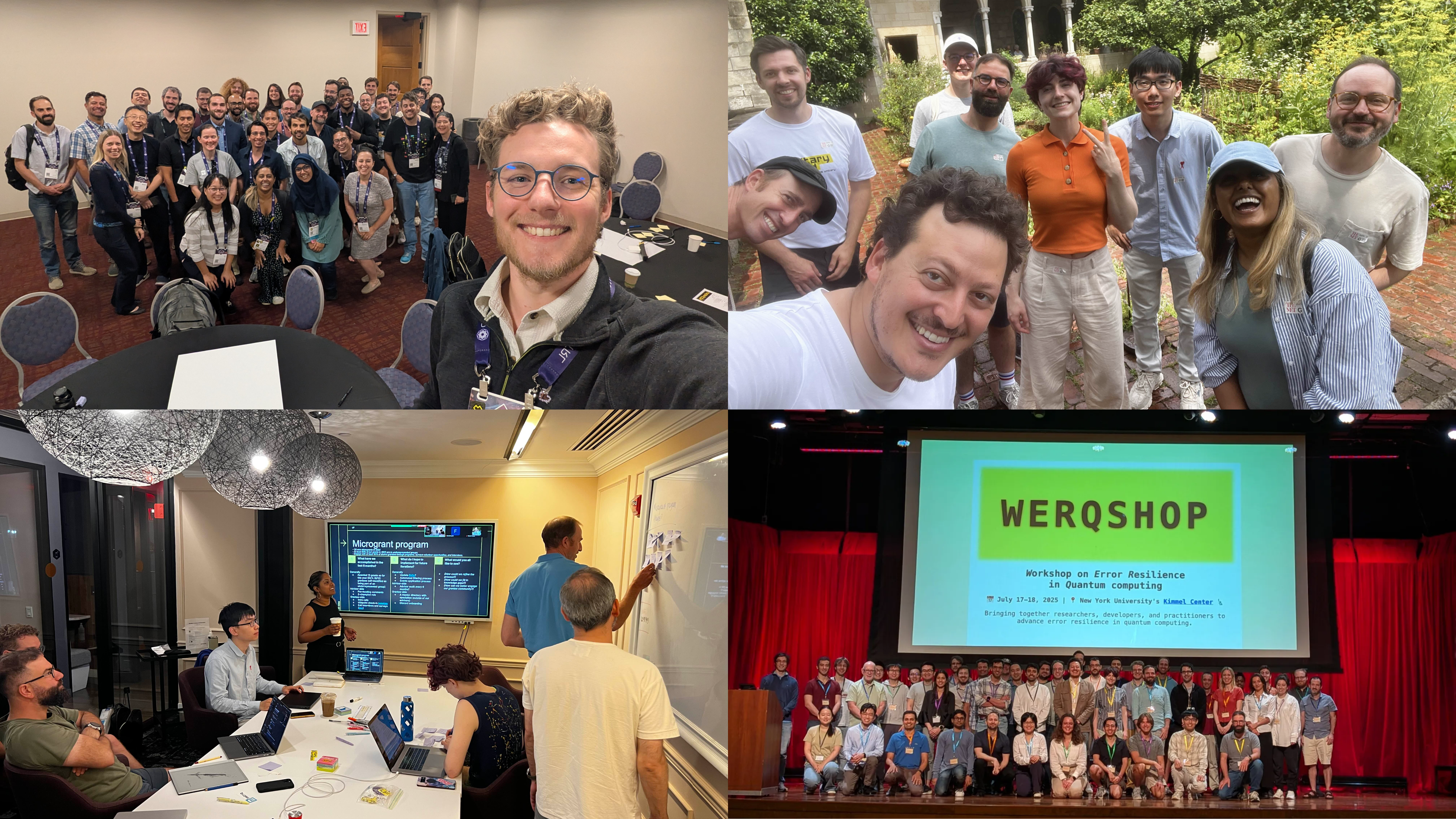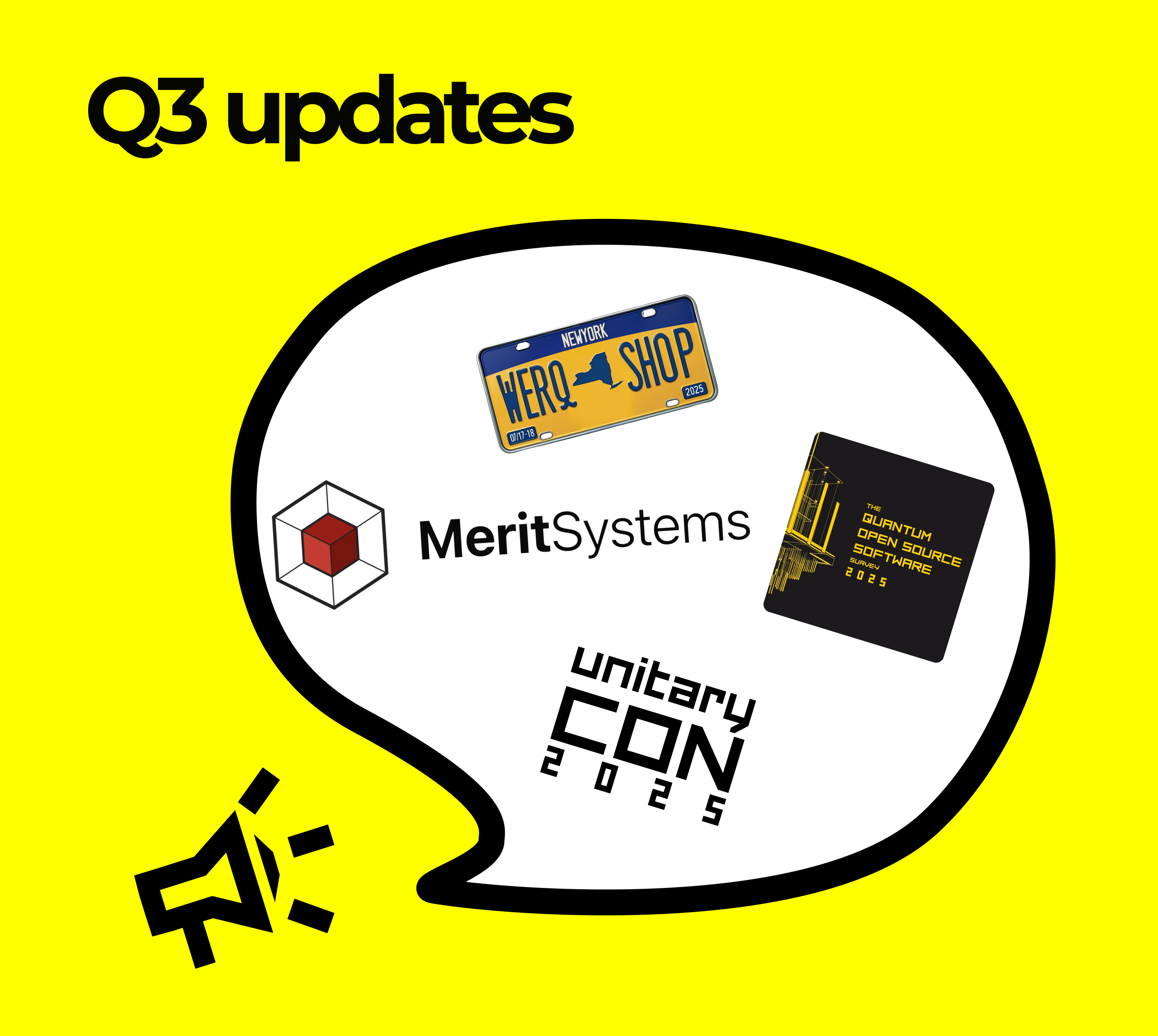2025 Q3 Updates: unitaryCON Recap, Merit Systems Collaboration, and Final Days to Take the QOSS Survey!
Dear Unitary Foundation community,
It’s officially Fall in the US, and the UF team is celebrating by looking back at all of our accomplishments during Q3 2025!
On September 2-4, we gathered our community in Albuqurque, New Mexico, for our annual unitaryCON conference. This year’s unitaryCON was co-located with IEEE Quantum Week, allowing our community to grow as well as connect to a larger network. You can read a full recap here.
In July, we also held the UF Staff retreat and WERQSHOP, our newest workshop on Quantum Error Resilience (you can check out blog post for an informal summary of the event, and our technical report for the key takeaways on the future of error mitigation). Below are a few photos of all of our summer in-person adventures!

During unitaryCON we also announced a very exciting collaboration with Merit Systems, a payment service platform designed to help reward open-source contributors. Our aim is to use the Merit System platform to pay community members who contribute to our projects, starting with UCC and Mitiq. You can read more about this opportunity and how to get involved here.

Finally, if you haven’t heard, the 2025 Quantum Open Source Software Survey is still open! We’ve extended the deadline from this Friday to this Sunday, October 5th. If you haven’t already, we hope you consider contributing and sharing with your open source networks. The Survey is a cornerstone of our work at UF and plays a large part in informing our community of what its current needs and challenges are.
Read more about our other news below and make sure you’re subscribed to our newsletter, LinkedIn, and Bluesky if you don’t want to miss any UF news!
Warmly,
The UF Team
New from Unitary Foundation
Mitiq
- 0.46.0 and 0.47.0 releases
- Across the last two releases, Mitiq has added new functionality for error mitigation workflows including support for custom calibration circuits, new visualization tools for comparing ZNE fits, and a full implementation of Probabilistic Error Amplification (PEA). Alongside these, there are improvements to documentation, tutorials showing how to combine multiple QEM techniques, and utilities like compare_cost to better track resource overhead.
Metriq
- Metriq-gym (now licensed under GPL-3) saw steady growth with three releases (0.2.0–0.4.0):
- Introduced benchmark suites
- LR-QAOA benchmark by micrograntee Alejandro Montanez Barrera
- Integration with Quantinuum Nexus
- Automated result uploads to GitHub data repository
- Easier onboarding with dedicated docs at metriq-gym.readthedocs.io
- Collaborated with Neer Patel, Tom Lubinski, and Siyuan Niu from QED-C (The Quantum Economic Development Consortium) for experimenting with application-based benchmarks in metriq-gym.
- Designed a new pipeline to share metriq-gym results with the community (stay tuned for a redesigned metriq.info!)
UCC
- Launched weekly public community calls on Discord
- New versions released:
- V0.4.8 [July 2025]: In v0.4.8, we updated documentation based on user feedback, improved infrastructure for automated releases and CI/CD, and bumped dependencies. For UCC-bench, we added new observables for simulation benchmarks and in UCC-FT added new QEC benchmarks.
- V0.4.9 [August 2025]: Version 0.4.9 optimizes target gate selection for hardware devices, introduces code test coverage reporting, bumps dependencies, and introduces Merit systems issue tagging for external contributors.
Other UF-Supported Projects
- QuTiP was featured on the AWS technical blog. You can read more here!
- UF supported the launch of the Jeff quantum exchange format.
Conferences + Events We Attended in Q3
- Nate Stemen served on the organizing committee of the Quantum Software 2.1 Workshop at IEEE Quantum Week 2025 alongside colleagues at Xanadu, ORNL, and more
- Jordan Sullivan presented a UCC lightning talk and compilation panel during the Quantum Software 2.1 Workshop (linked above)
- Brad Chase and Jordan Sullivan presented talks on UCC and UCC-FT at the International Workshop for Quantum Compilation(IWQC)
- Changhao Li presented metriq-gym in NYC Quantum Computing Meetup, IEEE QCE in New Mexico, and at Sandia National Labs’ APQC 2025 Workshop in Colorado
- Ben Castanon presented Unitary Foundation’s work at Quantum World Congress in DC last month
- Veena Vijayakumar spoke about quantum education and worksforce developmenton during a virtual panel hosted by the National Communication Museum in Australia
Q3 Grants
- To Maria Gragera Garces for HDH: Hybrid Dependency Hypergraphs for Distributing model agnostic quantum workloads. During this project period, the grantee will develop a consistent framework for the HDH library in order to release a complete and stable v1.0. The HDH library introduces a novel intermediate representation for distributing quantum workloads across heterogeneous quantum networks. Learn more on their Github Repo here
- To Jop Briët, Arjan Cornelissen, Francisco Escudero Gutiérrez, and Sander Gribling for designing quantum query algorithms on a laptop. This is a project to develop a software tool capable of generating optimal quantum query algorithms for approximating Boolean functions. The core of this project involves the implementation of semidefinite programs derived from two central methods in quantum query complexity: the adversary method and the (completely bounded) polynomial method.
- To Benny Zong Liu and Ilan Iwumbwe for QuteFuzz, a solution for detecting potentially semantic changing bugs in quantum compilers, weeding out simple but critical errors that can be very time consuming to detect conventionally.
- To Seun Omonije for Qernel, an agentic command line interface (CLI) to prototype and share quantum code.
Micrograntee Updates
- From Timothy King and Ella Meyer: the Quantum Arcade project is entering into a new phase: the Quantum Arcade Student Game Jam! Read more through Timothy’s post here.
- From Maxime Garnier and Thierry Martinez: the UF-Funded Graphix workshop came to a close last month. Read more about their work in Maxime’s post here. And check out the team’s github repo here.
- From Stephen DiAdamo: At Qoro, we recently open-sourced our application library called Divi, designed for generating batch jobs for quantum programs using parallelization techniques. It comes with a lot of built in tools to make it easy to add things like error mitigation and observable grouping. It allows users to simulate beyond 20 qubits in applications like QAOA by using partitioning. We’re always looking for more users to see how they find using Divi, so we can improve on it. We’d be happy if they try it out and also join our Slack community.
- From Davide Gessa: The new stable release of Qlasskit tagged as version v0.1.36 is now available. It now fully works with python >= 3.13.
- From Alejandro Montañez-Barrera: From Sept 22-25, I attended the APQC (Assessing Performance of Quantum Computers) 2025 workshop as an invited speaker, presenting the LR-QAOA Benchmarking. The title of my talk was “Evaluating the performance of quantum processing units at large width and depth.” I described the benchmark and mentioned that this is available for users in metriq-gym. Also, to mention that the LR-QAOA benchmarking is available in metriq-gym and with a digestible description at https://quantumbenchmarkzoo.org/
- From Eduardo Maschio: H-hat working version roadmap was announced at https://github.com/hhat-lang/hhat_lang/discussions/72 and https://github.com/hhat-lang/hhat_lang/discussions/74, and it’s to be released by January 2026. H-hat will also be presented at Munich Quantum Software Forum software pitches on October 20th-21st.
- From Seun Omonije: The alpha release (0.1.0-alpha1) of the Qernel CLI, an agentic CLI to prototype and share quantum code, is out now at https://github.com/computabeast/qernel. This is the first step of a project that aims to automate the conversion quantum computing research into runnable programs, and feedback on the project is requested! Tutorial videos and examples are on the way.
Other News from the Community
- Riverlane announced the release of Deltakit, their toolkit for QEC. The Deltakit SDK is now open-source under the Apache 2.0 license. You can explore the source code and start contributing on GitHub: https://github.com/deltakit/deltakit.
- In mid-September, the Quantum Women’s Network gathered for their inaugural event in NYC. Read more about the event, the mission of the QWN, and how you can get involved here (their next event is coming up at the end of October!).
Coming up
- Stay tuned for the the results of the 2025 QOSS Survey!
- Stay up-to-date on all things UF and Quantum Open Source Computing by following us on our communication channels:





